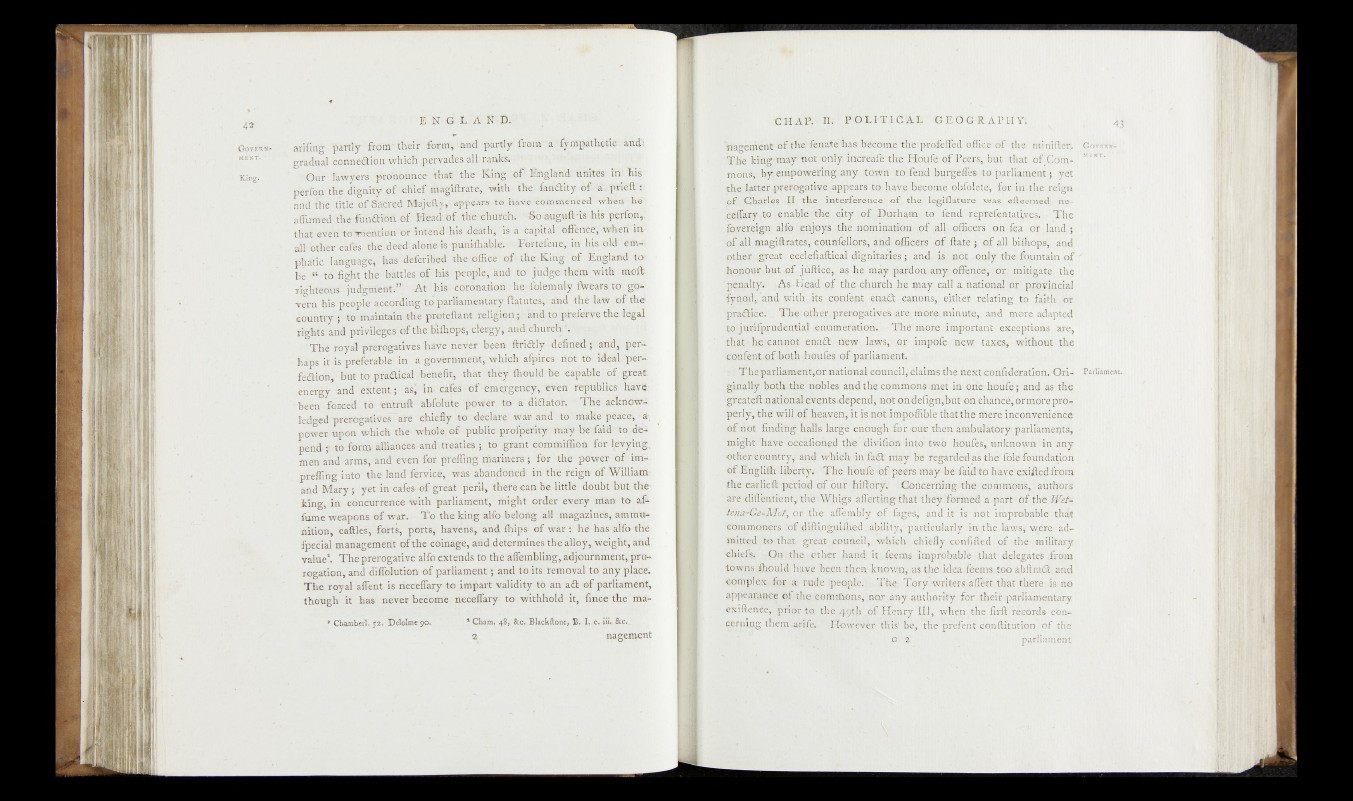
a - r if in g p a r t l y * f f b n f - - th e ir fo È n ^ ià t ïÆ p a r t l y - ' f s & M f - a i f y i h ^ a t h é ö c a*n(k
gradual connexion w h ic h ,pervades -all ranks.
Our lawyers pronounceHhat * the" King of: laagland unites g g His
perfon the dignity of chief'magiftrate,. with the fah&ity o f a. prieft
and the title of Sacred Majeftyj appears .to have commenced when he'
affirmed th e fundiion of Head of the church, »So-amguft'is his perfon,..
that even to mention or intend his death, is a capital offence, when in
all other cafes the. deed alone is punifiiable. : 1‘brtefcue, in his old emphatic
language, has defended the .office of the King of England to
he “ tó fight the -battles of his people, and to ju d g e them with mod.
righteous judgment.”] -At his coronation he iólcnmly fwears' to g o vern
his people according to parliamentary fiatutes, and the law of the-
country % to maintain the proteftan-t religion; and topreferve the legal
rights and privileges, of the bilhops,"clergy*, an d c h u rc h y .:^
T h e royal prerogatives have never befen ftri&fy dë&öê&f and, perhaps
ihis preferable ift A government?-,; Ulhich-afpkOs' fiôt ter idéal-*"per-i
feflion, but to pfadtical-benefit, -tfeàMheÿ'ïhôuM be ê'apaM|fbf g re a t
energy and e x te n t;’ in- cafes of"ém'çfgehey,' éven republics havd
'h é é n 'forced to* efitriift abfoMe-pöwe-r tó ’'£ didator. ■'The» ackiftü#*-
îedged prérogatives are chiefly to declare war and to make peace, *
powerfupon which the whole ©f - public proipèrity
pend '? to form affiaticês and-treaties ; to grant óoffimifftón ’for-levying,
men and arms, and èvën for preffihg tharïnefö ; föfi' thé jpW e r o f im-
preffiig into -the lhad ferfieè, was aban^otted iS dW ïé ig a 'o f-W ilfe îfti
and Mary ; yfet in eafea ©f great péril, there can be littieJlfüiÊt but thé
king, in concurrence with parliament, bright order every ittâh -to afe
fume weapons ©f war. T o the king, alfö bélQög all mhgtfdiSfe-,. aôrt»»-
nition, caftles, forti, ports, havens, and Ihip# vlïffh a s^ îff^ ih é :
Special management of the coinage, and determines theaftoy^weight; afed
value*. The prerogative alfo extends to the âflëfnbling, adjoüramént, p ro -
rogation,and diflblution of parliament ; and to its removal to: any place..
T h e royal affent is rieceffary to impart validity rO a n 'aiaféff pâtlkiïïieat;,
though it has never become necelfaty to withhold it, rfliiöè'fhe ma-
1 Chamber!. 52. Delolme go.. f &c. Blackftone,
3; p a g em e n t
'iragement of' lhe fen*ate: has ..become the profefled office of the minifter. Goyerk- .*
The king may lidtfpiily increafe the Houfe of Peers., but that of Cdmh MZHT'
mons-, hyjempowering.any Mown tojlerid burgefles: to parliament; yet
the latter prerogative appears to have become obfoigM for in the reiga
^ fyQ h g rle 'sII th e ^ 1*^felieni©^';^fctfi‘g|'||gf|^(iiaxe<?§yas.«fteemed. ne-
celfary.to enable the c ity , of Durham to fend repr-efentatlves. . The
^lavl^eign} 4^9 11,1 o f alj^flicers , omfea Uand j
pf allSm'agfflr^Ss,jp©i}r|fe}lgH^*a.lid. officers * Of . bi-fhops, -and
p ^h e r* ^ e ^ t, bedffi adieu j, djig&itaHes,;.-and^is iy6t.6®%? jtfeejfouptaipjof '
Ij^pn0ufjbutvp^ji^ftice, SjS he mayljja^dp^ahy dfen,Gp,j<pk,’ mbiga|e;,_;kl|e
'gprs-alty. |A^l^.ead 'pf ijar^Gbptnh^he'pmy call a.hatipnal'or'provfncyal ■
fynqd,'and with its confent enadt canons,'eithet: relating to faith or
practice. . The* other,prerogatives a re ;m © re ,;i^ r^ ^ f asd'^or^ad-apted
to; ji|sifpr,udonfetfi e-kpggjti9 | #*ar 9,
th jtr li^j-caM^t ^aaftgyjew ;.d?tws,b^il' Ihewj taxSs^ * yd ’tWouLthe
co^fe.n^f;b,o|h3h©tife§.fo£ipa,r]ici3riQnt.
>TThe;parliam'fint,'pr’nationkl?n.QnS3|il^lajmsiHbdnext{e-pnfiddEati0n.'Qri- Pailiameiip.
gin'all^ l^oth^themiiile^ an d the comm®ndipigt(ihl'Si^^|atifey and'as'the
g r e atell: smtib naievem ts depernd^mot ondefiga^hujUfen’tjk n e e ] ©rWoVeiprOie i
perly, the’ will o f heaveny it is h o t ’imppffible Ihatthd nitk® ihs^mvemience
of not finding halls large' enough Tor our then ambulatory* parliaments, g
might have occ.afion.ed the divifion. into , two houfes*, unknown in any
ptlier.icountry, and which in fad:7 lilay be regarded as the foie foundation ,
of Englifh liberty. The houfe of'pders may be faid to have exifted froin
the eaidiefl'rperiod o’f our hiftory. Concerning the commoUs,j-authors
are dilfentient, the Whigskfferting that they's-fisirmed a part o f the WeU
tena-Ge-Mot\ or The aflembly of fages, and it is improbable’ that
eommonersjof diftinguilhediiabihtyd particularly, in the l a * , were- ad-
mitted: to .that great .council, which chiefly confiHed of the military
■chiefSi On the p-thier hand, it fee ms improbable,. t-hat delegates fi-om
to.whs-, fhohfeh hitve been;then knordh, as theddeaTehms too abftrddi jahd
complete' fpr a rude, people. . iphe_ Tory writerS vaflert that there .is .no ,
appearance pfithe pofn-ihons, -nor any authority for their, parliamentary
exiftence, prior to the j£9t.h of H en ry III, when the firfl: records con-
£.erning:them arife. floweVer this.1 be, the prefent conftitution of the
‘ | I * ‘ x parliament